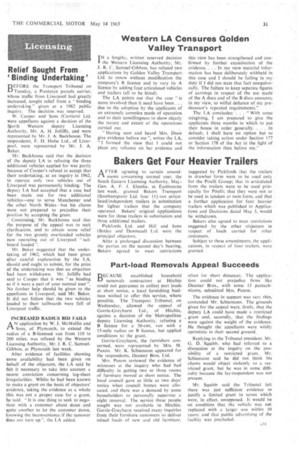Part-load Removals Appeal Succeeds
Page 33

If you've noticed an error in this article please click here to report it so we can fix it.
BECAUSE established household removals contractors at Hitchin could not guarantee to collect part loads at short notice, a local furnishing business wished to offer this service, where possible. The Transport Tribunal, on Wednesday, allowed the appeal of Gorrie-Greyhurst Ltd.. of Hitchin, against a decision of the Metropolitan deputy Licensing Authority,' refusing a
B licence for a 30-cwt. van with a 15-mile radius on B licence, but applied conditions to the grant.
Gorrie-Greyhurst, the furnishers concerned, were represented by Mrs. M. Puxon. Mr. K. Schiemann appeared for the respondents, Dcarncr Bros. Ltd.
Mrs. Puxon reviewed the evidence of witnesses at the inquiry who had had difficulty in getting two or three rooms of furniture moved at short notice. The local council gave as little as two days' notice when council homes were allocated, and there was a demand by some householders to personally supervise a night removal. The service these people sought was not available in Hitchin. Gorrie-Greyhurst received many inquiries from their furniture customers to deliver mixed loads of new and old furniture, often for short distances. The application could not prejudice firms like Deamer Bros., with some 15 pantechnicons, submitted Mrs. Puxon.
The evidence in support was very thin, contended Mr. Schiemann. The grounds given for the appeal were, firstly, that the deputy LA could have made a festrieted grant and, secondly, that the findings were against the weight of the evidence. He thought the appellants were wildly optimistic in their second ground.
Replying to the Tribunal president, Mr. G. D. Squibb, who had referred to a discussion at the inquiry on the possibility of a restricted grant. Mr. Schiemann said he did not think his clients would object violently to a restricted grant, but he was in some difficulty because the lay-respondent was not present.
Mr. Squibb said the Tribunal felt there was just sufficient evidence to justify a limited grant in terms which were, in effect, unopposed. It would be on condition that the vehicle was not replaced with a larger one within 10 years; and that public advertising of the facility was precluded.




















































































































